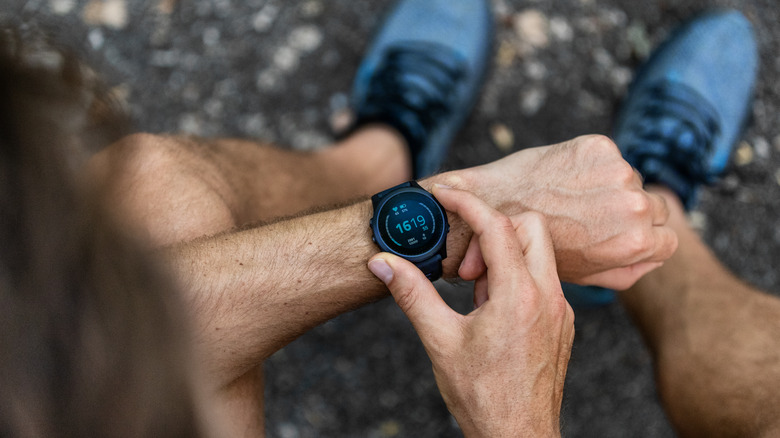This Is How To Know If Your Fitness Tracker Is Accurate
Fitness trackers are popular accessories for runners, gym-goers, and other exercise enthusiasts. Trackers can keep a record of many different aspects of your health, from your heart rate to calories burned to the number of steps you've taken in a day. If you're using the information from your tracker to impact other aspects of your life, like how many calories to eat during the day based on the number you burned during your workout, you need this tech device to be as accurate as possible. But how accurate are they, really?
"The short answer is: It depends," Assistant Professor of Kinesiology and Epidemiology at the University of Wisconsin-Madison, Lisa Cadmus-Bertram told Digital Trends. "The long answer is that they are accurate enough to be useful for most people for most purposes. But it also varies by what it is you're trying to measure."
Most fitness trackers measure your step count accurately. You can confirm accuracy by comparing your fitness tracker's step count to the one on your smartphone. If the two are relatively close, you can rest assured that your steps are being counted accurately.
Other calculations on fitness trackers may be way off
Although your step count might be accurate, research suggests that many trackers overestimate your calories burned. A 2017 Standford University study found that out of seven tested devices, none accurately determined how many calories the user burned during a given activity (via NBC News). The trackers ranged from being 27% to 93% off when measuring energy expenditure.
"The error depends on the type of activity you're tracking," said lead study author Anna Scherbina, "For activities like walking and sitting, the results are more accurate than for more intense pursuits, like spinning and running. The point is, you're not burning as much as you think you are."
A 2018 review of previous studies, conducted by the British Journal of Sports Medicine, found similar results. "Consumers should be aware of the potential for error in their devices, especially if they are using it to inform their eating behaviors," lead study author Ruairi O'Driscoll of the University of Leeds in the U.K. told Reuters.
Experts suggest using your fitness tracker as an estimate of how many calories you're burning throughout the day. While you shouldn't be making decisions calorie-by-calorie, a general idea of your energy expenditure can help you lead a flexible, healthy lifestyle.


